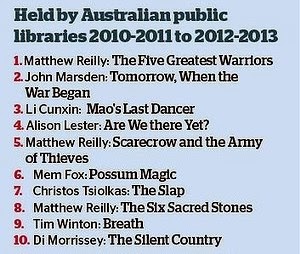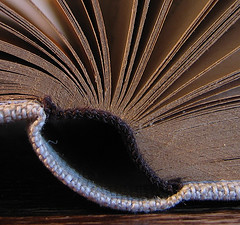The Sydney Morning Herald headline trumpets “Library book borrowers stay true to their favourite authors, survey reveals”

John Marsden's dystopian Tomorrow, When the War Began and Li Cunxin's autobiography Mao's Last Dancer followed.
In
school libraries, it was Mem Fox's evergreen Possum Magic that dominated bookshelves in 2012-13, followed by Emily Rodda's Rowan of Rin and Marcia Vaughan's Wombat Stew.
The
tables are created by the Public Lending Right and Education Lending Rights scheme, which aims to compensate for the creators' loss of potential sales from loans in libraries. In the old horror days library staff had to spend days pouring over lists and card catalogues gathering the data, but thanks to leaps in technology, now a machine can do it in a fraction of the time.
Almost
$20 million was distributed for the last financial year. To be eligible, libraries must stock a minimum of 50 copies of the same title and payments based on copies held. The charts suggest the enduring value of Australian children's literature as new generations continuing to rediscover old favourites.
Borrowers preferred popular fiction over literary titles and, once they discovered an author they liked, they kept returning to the backlist over and over again.
Christos
Tsiolkas' The Slap was the most widely held work of Australian literary fiction over the past three years along with Tim Winton's Breath, just ahead of Di Morrissey's The Silent Country.
Morrissey
had three books in the top 30. The late Bryce Courtenay had four titles in the top 30 while Geraldine Brooks had two.






No comments:
Post a Comment